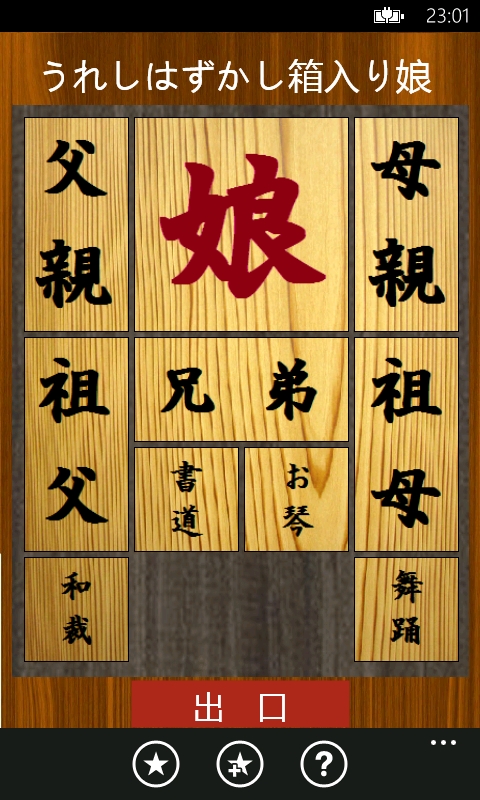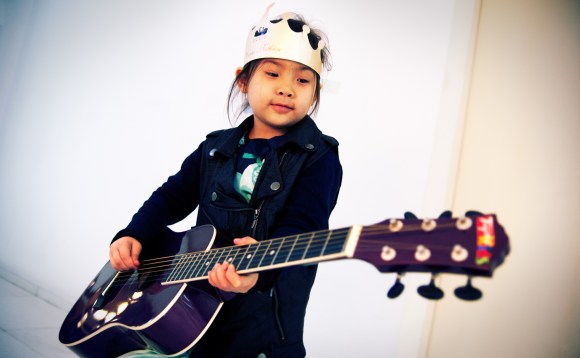
This is the first article in our brand new “Myth-Busters” series that attempts to provide definitive answers to readers’ questions about Japanese culture, language and concepts. If you’ve ever asked yourself “Is it really true that the Japanese…..?” then just ask us! We’ll let loose the RocketNews24 hound dogs to track down the answer.
Our first myth-busters topic, prompted by a question from a Canadian reader, is hakoirimusume (箱入り娘) or “Daughter in a box,” used to describe a girl who grows up protected by her family, as if being kept in a box. The term originated in the Edo Period (1603-1867), but do such shielded daughters still exist today?
Our hound dogs are on the trail! Results after the jump.
The term hakoirimusume is familiar to all Japanese people. A quick search on the Internet reveals the term has been used as a title for movies, manga and a TV drama series. In addition, it is the name of a brand of mikan oranges, and the title of a sliding block puzzle game. It is even the name of an all-female idol group (from 2014) ハコイリ♡ムスメ (yes, spelled with a heart in between).
▼A hakoirimusume puzzle game app. Notice how the daughter, the red 娘, is kept surrounded by family members (father, mother and brother, and then grandparents).
Naoko Takemaru, a PhD and assistant professor of Japanese who specializes in Japanese Language Studies and Gender Studies at the University of Nevada defines hakoirimusume as, “A young single woman who leads a sheltered life with her protective family” in her book, Women in the Language and Society of Japan (McFarland, 2010). She goes on to write that it is “mostly a thing of the past because of a steady increase in the number of young women who live away from their family for education and career.”
▼Not the traditional image of a hakoirimusume!
Curious, I asked some Japanese people, in the format of on-the-street-interviews, what they thought of the term. Takehiko Saiki, a professor who teaches mostly women at Chugoku Junior College in Okayama Prefecture says, “The image that comes immediately to mind is a girl who lives a sheltered or protected life. To me, these girls are rare today. I would say I’ve met only one or two girls who I think might have been a hakoirimusume in the past 20 or so years.”
Junko Ogura, a middle-aged woman with an 18-year-old son, said: “I know of a hakoirimusume! When she was in high school back in the late 70s, she was not allowed (by her father) to go on a school trip, because she had to spend two nights away from home, with boys. But this case is old. The term itself is changing its definition. I think these days, every child is a hakoirimusume (daughter in a box) or hakoirimusuko (son in a box), and it means more like ‘spoiled child.’”
We asked Takemaru about this and she agrees, adding, “The term is definitely changing its definition particularly because of the ongoing declining birthrate.”
So, there you go! The original term hakoirimusume is still common in pop culture as a moniker for movies, comics and games, but is largely obsolete when it comes to practice. In addition, the term seems to be changing meaning perhaps due to children being increasingly coddled by their parents who give them the means to do what they want.
Is there something about Japanese language or culture you find hard to believe? Let us know in the comments section and we’ll put the RocketNews24 hounds on the case!
Featured Image: Flickr (Jorge Jaramillo–cropped)



 Is Japanese language becoming less discriminatory towards women?【Women in Japan Series】
Is Japanese language becoming less discriminatory towards women?【Women in Japan Series】 Japan slowly begins to openly discuss crossdressing men in heterosexual relationships
Japan slowly begins to openly discuss crossdressing men in heterosexual relationships Daughter of Japanese idol and former SMAP star Takuya Kimura makes her modelling debut in Japan
Daughter of Japanese idol and former SMAP star Takuya Kimura makes her modelling debut in Japan Japanese business women who’ve beaten the system 【Women in Japan Series】
Japanese business women who’ve beaten the system 【Women in Japan Series】 Nike commercial about gender inequality in Japan receives backlash online【Video】
Nike commercial about gender inequality in Japan receives backlash online【Video】 Highest Starbucks in Japan set to open this spring in the Tokyo sky
Highest Starbucks in Japan set to open this spring in the Tokyo sky Family Mart’s Shibuya Cat Street shop hosts first-ever rescue cat photo exhibition for Cat Day
Family Mart’s Shibuya Cat Street shop hosts first-ever rescue cat photo exhibition for Cat Day Foreign tourists in Japan will get free Shinkansen tickets to promote regional tourism
Foreign tourists in Japan will get free Shinkansen tickets to promote regional tourism Survey finds that one in five high schoolers don’t know who music legend Masaharu Fukuyama is
Survey finds that one in five high schoolers don’t know who music legend Masaharu Fukuyama is Development of Puyo Puyo puzzle game for use in nursing homes underway
Development of Puyo Puyo puzzle game for use in nursing homes underway We eat at three Japanese family restaurants to find the one with the best-value breakfast
We eat at three Japanese family restaurants to find the one with the best-value breakfast Beautiful blue apple jam is taking the Japanese internet’s breath away!
Beautiful blue apple jam is taking the Japanese internet’s breath away! Osaka establishes first designated smoking area in Dotonbori canal district to fight “overtourism”
Osaka establishes first designated smoking area in Dotonbori canal district to fight “overtourism” We visit the Hello Kitty theme park to eat an adorable Sanrio meal
We visit the Hello Kitty theme park to eat an adorable Sanrio meal We try the new Famichiki Burger from Family Mart
We try the new Famichiki Burger from Family Mart The 10 most annoying things foreign tourists do on Japanese trains, according to locals
The 10 most annoying things foreign tourists do on Japanese trains, according to locals Starbucks Japan releases new sakura goods and drinkware for cherry blossom season 2026
Starbucks Japan releases new sakura goods and drinkware for cherry blossom season 2026 Naruto and Converse team up for new line of shinobi sneakers[Photos]
Naruto and Converse team up for new line of shinobi sneakers[Photos] Is Sapporio’s Snow Festival awesome enough to be worth visiting even if you hate the snow? [Pics]
Is Sapporio’s Snow Festival awesome enough to be worth visiting even if you hate the snow? [Pics] Japan has trams that say “sorry” while they ride around town…but why?
Japan has trams that say “sorry” while they ride around town…but why? Tokyo Skytree turns pink for the cherry blossom season
Tokyo Skytree turns pink for the cherry blossom season Sakura Totoro is here to get spring started early with adorable pouches and plushies
Sakura Totoro is here to get spring started early with adorable pouches and plushies Poop is in full bloom at the Unko Museums for cherry blossom season
Poop is in full bloom at the Unko Museums for cherry blossom season Shibuya Station’s Hachiko Gate and Yamanote Line stairway locations change next month
Shibuya Station’s Hachiko Gate and Yamanote Line stairway locations change next month Japan’s new “Cunte” contact lenses aren’t pronounced like you’re probably thinking they are
Japan’s new “Cunte” contact lenses aren’t pronounced like you’re probably thinking they are Japan’s newest Shinkansen has no seats…or passengers [Video]
Japan’s newest Shinkansen has no seats…or passengers [Video] Foreigners accounting for over 80 percent of off-course skiers needing rescue in Japan’s Hokkaido
Foreigners accounting for over 80 percent of off-course skiers needing rescue in Japan’s Hokkaido Super-salty pizza sends six kids to the hospital in Japan, linguistics blamed
Super-salty pizza sends six kids to the hospital in Japan, linguistics blamed Starbucks Japan unveils new sakura Frappuccino for cherry blossom season 2026
Starbucks Japan unveils new sakura Frappuccino for cherry blossom season 2026 Take a trip to Japan’s Dododo Land, the most irritating place on Earth
Take a trip to Japan’s Dododo Land, the most irritating place on Earth Is China’s don’t-go-to-Japan warning affecting the lines at a popular Tokyo gyukatsu restaurant?
Is China’s don’t-go-to-Japan warning affecting the lines at a popular Tokyo gyukatsu restaurant? Survey asks foreign tourists what bothered them in Japan, more than half gave same answer
Survey asks foreign tourists what bothered them in Japan, more than half gave same answer Japan’s human washing machines will go on sale to general public, demos to be held in Tokyo
Japan’s human washing machines will go on sale to general public, demos to be held in Tokyo Starbucks Japan releases new drinkware and goods for Valentine’s Day
Starbucks Japan releases new drinkware and goods for Valentine’s Day We deeply regret going into this tunnel on our walk in the mountains of Japan
We deeply regret going into this tunnel on our walk in the mountains of Japan Studio Ghibli releases Kodama forest spirits from Princess Mononoke to light up your home
Studio Ghibli releases Kodama forest spirits from Princess Mononoke to light up your home Major Japanese hotel chain says reservations via overseas booking sites may not be valid
Major Japanese hotel chain says reservations via overseas booking sites may not be valid Put sesame oil in your coffee? Japanese maker says it’s the best way to start your day【Taste test】
Put sesame oil in your coffee? Japanese maker says it’s the best way to start your day【Taste test】 No more using real katana for tourism activities, Japan’s National Police Agency says
No more using real katana for tourism activities, Japan’s National Police Agency says